|
|
|
|
Every year thousands of migrants come to work in Canada. From harvesting the food in our stores to caring for the elderly, these workers form a vital part of the economy. Yet despite being critical, they often face harsh conditions, isolation, abuse, injury and even death as a result of immigration policies designed to leave them powerless.
In the latest episode of our podcast Don’t Call Me Resilient, I speak with documentary filmmaker and OCAD University Professor Min Sook Lee. She has been documenting the voices of migrant farm workers in Canada for two decades. What Prof. Lee has to say about the treatment of these workers during COVID-19 shatters any remaining myths about “Canada the Good.”
Every week, we highlight articles that drill down into the topics we discuss in the episode. This week we offer these complementary stories:
Also today:
Regards,
|
Vinita Srivastava
Producer | Director of Innovation | Senior Editor, Culture + Society
|

|
|
Our latest podcast episode
|
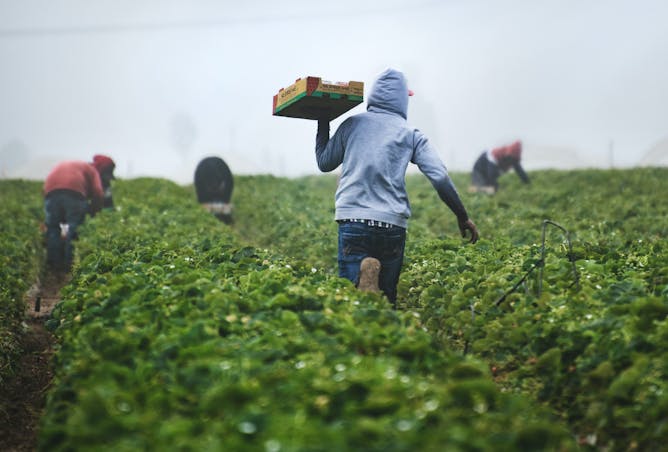
COVID-19 has laid bare how migrant workers in Canada are treated.
(Tim Mossholder/Unsplash)
Vinita Srivastava, The Conversation; Anowa Quarcoo, The Conversation; Ibrahim Daair, The Conversation
For much of its history Canada has encouraged people to come and work in this country. However, racialized migrant workers often face an immigration system designed to leave them powerless.
|
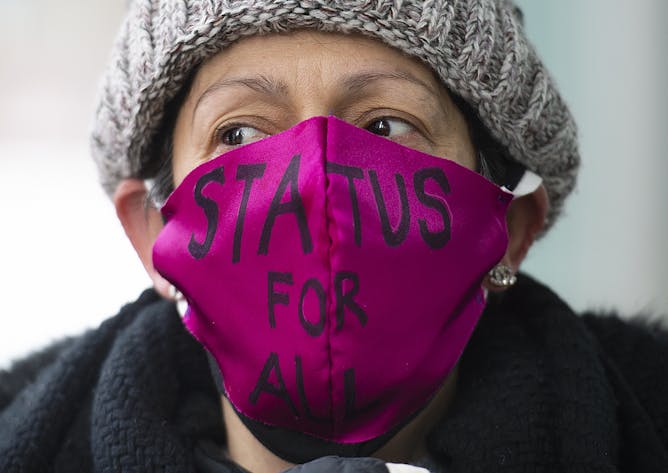
A woman takes part in a protest in Montreal, Jan. 30, 2021, to demand status for all workers and to demand dignity for all non status migrants as full human beings as the COVID-19 pandemic continues in Canada and around the world.
THE CANADIAN PRESS/Graham Hughes
Vinita Srivastava, The Conversation; Ibrahim Daair, The Conversation
How we treat migrant workers who put food on our tables: Don't Call Me Resilient EP 4 transcript
|

Temporary migrant workers in Canada are facing COVID-19 while dealing with an immigration system that leaves them vulnerable.
THE CANADIAN PRESS/Christopher Katsarov
Fay Faraday, York University, Canada
The COVID-19 pandemic has brought further suffering to migrant workers in Canada already experiencing the abuses of discriminatory immigration policies and poor working conditions.
|
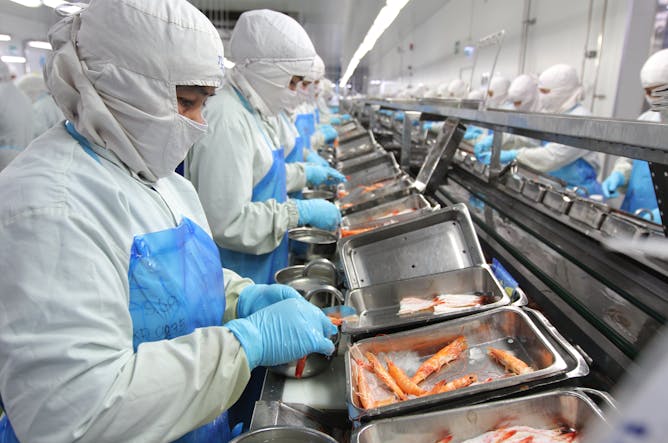
Seafood processing workers in Thailand.
(Shutterstock)
Peter Vandergeest, York University, Canada; Melissa Marschke, L’Université d’Ottawa/University of Ottawa; Peter Duker, York University, Canada
Many have looked to Asia for lessons on successful pandemic management. However, recent COVID-19 outbreaks in Thailand and nearby countries also offer warnings about what not to do.
|
Today's Featured Articles
|
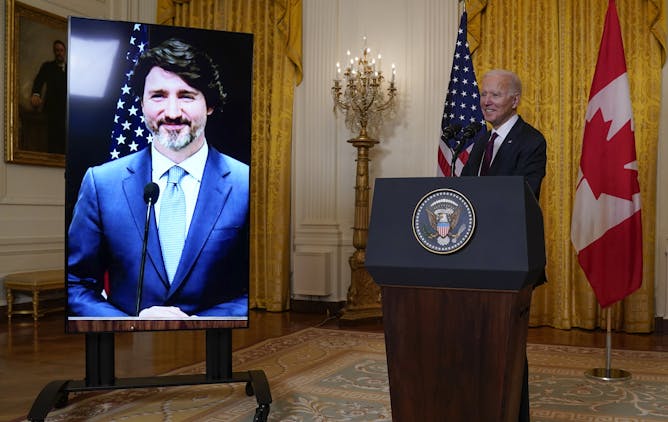
U.S. President Joe Biden speaks after holding a virtual meeting with Canadian Prime Minister Justin Trudeau, in the East Room of the White House on Feb. 23, 2021, in Washington.
(AP Photo/Evan Vucci)
Thomas Klassen, York University, Canada
Many Canadians see it as positive that Joe Biden's first meeting, albeit virtually, was with Justin Trudeau. Nonetheless, Canadians have learned over two centuries to be wary about their neighbour.
|
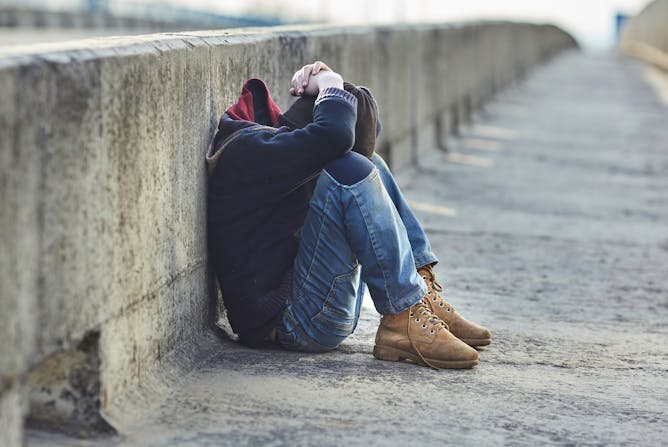
Once they turn 18, youth in foster care are required to fend for themselves. This includes finding shelter and services.
(Shutterstock)
Marsha Rampersaud, Queen's University, Ontario; Linda Mussell, Queen's University, Ontario
The Ontario provincial government announced a moratorium on ending foster care at age 18 during the coronavirus pandemic, but this is due to end on March 31.
|

Water rushes through the Carillon Hydro electric dam in Québec.
THE CANADIAN PRESS/Ryan Remiorz
Brett Dolter, University of Regina; Blake Shaffer, University of Calgary; G. Kent Fellows, University of Calgary; Nicholas Rivers, L’Université d’Ottawa/University of Ottawa
The electricity sector is expected to play a key role in Canada's push to net-zero emissions. Enhancing long-distance transmission can be lower the cost of providing clean and reliable electricity.
|
La Conversation Canada
|
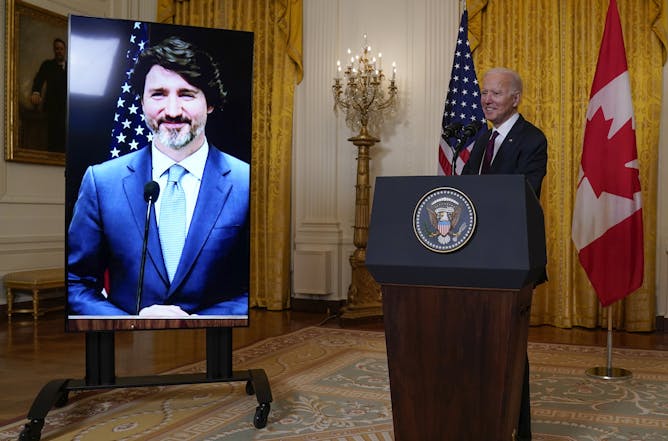
Le président américain Joe Biden rencontre les médias après sa réunion virtuelle avec le premier ministre canadien Justin Trudeau, dans la salle Est de la Maison Blanche, le 23 février 2021, à Washington.
(Photo AP/Evan Vucci)
Thomas Klassen, York University, Canada
Le fait que la première rencontre de Joe Biden avec un dirigeant étranger ait eu lieu avec Justin Trudeau en réjouit plusieurs. Mais les Canadiens ont appris, en 250 ans, à se méfier de leur voisin.
|

La beauté des micro-séances d'exercice est qu'elles ne nécessitent aucun équipement, ni même un changement de vêtements!
Shutterstock
Scott Lear, Simon Fraser University
De courtes périodes d’activité de 20 secondes répétées tout au long de la journée permettent d’améliorer ses capacités cardiovasculaires, d’être plus productif et d’avoir plus d’énergie.
|
| |
| |
| |
| |

|
| |
| |
| |
| |
| |
| |
| |
| |
|
|
|
|
|
|
|